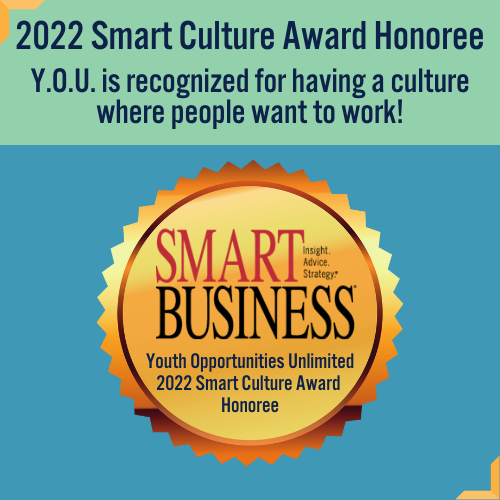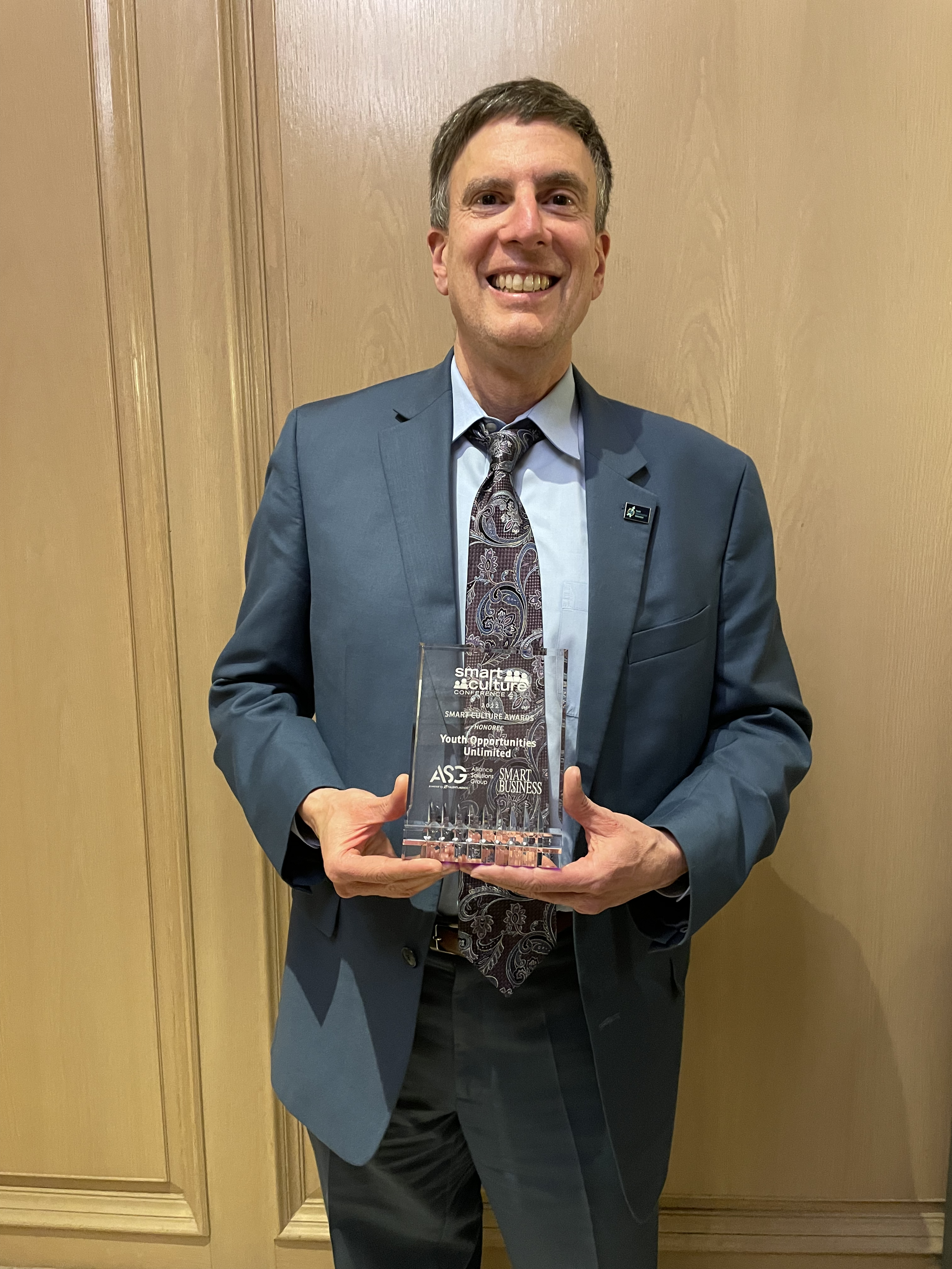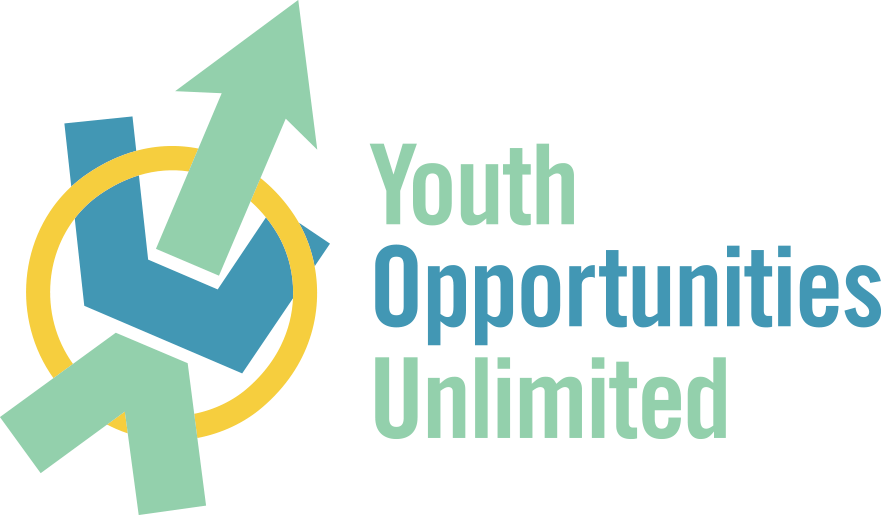Smart Culture Awards 2022: Y.O.U. is recognized for having a culture where people want to work!


Y.O.U. was honored on April 6, 2022. CEO Craig Dorn is pictured with the award.
How Y.O.U. has created a culture where people want to work
As a non-profit organization, our mission is the primary motivator for our staff to come to work every day and perform at a high level. We ensure we are leaning into it by intentionally putting it at the center of our decision-making and day-to-day activities. We have a mission moment to kick off each board meeting to ground ourselves in purpose. We list the mission on internal documents, and whenever confronted with a decision, always use the guiding question: what is best for the youth we serve.
Our values are truly the centerpiece of our culture, and we live by the mantra that our values guide decisions and behavior. It is how we act when nobody is looking. These values resonate with our staff and, along with our mission, drives a culture that is positive, family-friendly and performance motivated.
Our values are:
Excellence/Continuous Improvement
Advocacy
Accountability/Stewardship
Collaboration
Data-informed decision making
Diversity/Equity/Inclusion
We highlight a value each month at staff town hall meetings and rotate which staff discuss the value, what it means to them, and how it is addressing our work. We have a DEI Advisory Council that puts that value front and center. The Council meets monthly and provides internal accountability to make sure we are elevating our game with staff engagement and youth preparation. Tactics include monthly discussion sessions, a book club, and revision of HR and vendor policies.
For Accountability, Excellence and Continuous Improvement, we have a robust performance management system for both employee goals and feedback from youth we serve. We require monthly and encourage weekly conversations between supervisors and their staff. The focus of these conversations is growth, development and problem solving. We endeavor to learn from mistakes and use them as moments to grow professionally.
Collaboration is the center of our internal and external model. Internally we have teams that work together on projects to successfully deliver our programs. Externally collaboration guides how we approach partnership and addressing system societal issues. We work closely with local government, the business community, schools, nonprofits, and employers to collectively put teens and young adults on a path to economic self-sufficiency. Our approach is intentionally solution-oriented, focused on mutually beneficial goals and meeting community needs.
Personal and professional team member development
In 2021, we doubled our investment in professional development, $300 per staff member, under three broad strategies:
Self-directed based off performance management goals using platforms, such as BizLibrary and Dayforce
Organization-wide internal training on topics designed to build the kind of high performance and caring culture we are creating. Crucial Conversations, Decision-making, Providing feedback, and Emotional Intelligence
Opportunity for further professional development through the Carol Rivchun Development Fund (CRED) Employee Scholarship. The fund is named in honor of former CEO Carol Rivchun who strongly advocated for continuing education of her staff. Awardees educational experiences have included Six Sigma Yellow Belt certification, Salesforce Administrator certification, Spanish courses, wellness coaching, and leadership programs.
Office space
In the past 5 years, Y.O.U. has more than doubled in size, outgrowing the previous office space. Initially after the growth Y.OU. operated from two main offices, a county building, and in satellite locations across the Northeast Ohio community. The main offices were functional with minimal care for the design of the space, limited natural light, hand-me-down furniture from local business partners, and shabby carpet. Managers were in offices, line staff in cubicles. We also had a traditional workplace culture where staff primarily worked in the office during core hours of operation.
Staff expressed the wish for a unified headquarters that was welcoming to both staff and the people we serve. In 2021, Y.O.U. was able to do just that. The COVID-19 pandemic was a catalyst toward abandoning our in-office culture and moving toward flexible hybrid working. We moved the headquarters into a singular office with extensive natural light, an open floorplan, hoteling for flexible workspaces, and technology to compliment hybrid working. The office is located in the heart of downtown Cleveland above a local diner and includes free access to a fitness facility. Not only did the dream of unifying the headquarters come true, but the office is now a welcoming warm environment for both staff, participants, and visitors of the organization. Visitors are greeted with the mission, vision, values, and inspirational phrases and quotes displayed on the walls to remind them of what Y.O.U. stands for, what we know they can accomplish as individuals, and what we can accomplish as a community.
We have created more collaborative spaces for team members and eliminated the hierarchy of who gets offices. All but a few staff work in common areas.
Our work in the community is highly important in engaging with Northeast Ohio residents where they are both literally and in their current state of their career development and/or life circumstance. With that said, for staff that work out of our headquarters, we are proud of the changes we’ve made in this area, responding directly to staff feedback, to strengthen our workplace community in a beautiful environment.
Diversity
We have an internal Y.O.U. Diversity, Equity, & Inclusion (DEI) Advisory Council with a goal to guide and support efforts to address systemic racism through the examination of our practices. The DEI Advisory Council provides guidance and assures accountability as it pertains to our efforts around improving the organization through the lens of DEI. The Council is intentionally comprised of both board members and staff who represent a diverse pool our organization’s population based on age, gender, race, sexual orientation, religion, leadership level, and employee tenure. The DEI Advisory Council champions for the utilization of an Equity Impact Analysis, five questions to consider when reviewing any policy, practice, protocol, strategy, or decision to ensure they are equitable to all groups that may be impacted by them.
Advocacy and Diversity, Equity, and Inclusion complement one another as explicit organizational values. With more than 85% of participants identifying as black or African American residing in primarily low-income communities, we see it as a component of our mission to fight systemic racism to champion for a more equitable society. This manifests in many ways, such as coaches and case managers addressing participant barriers like transportation and childcare as well as training employers on reimagining workplace standards to utilize equitable hiring practices or lobbying legislators in innovative ways to spend public funds to promote training opportunities for young adults.
The impact of your culture and how it influences our success
Our success is predicated on staff feeling great about working at Y.O.U. Because we are a nonprofit, our compensation lags the private sector. Therefore, we create other incentives that motivate staff, and we focus on the kind of open and honest communication and dialogue that helps people thrive.
We have a positive feedback culture through our Y.O.U.dos, kudos, system. Staff formally submit brief entries citing the excellent work of their team members. Both Y.O.U.dos nominators and recipients are celebrated and recognized. This promotes an environment where team members recognize and celebrate the success of their peers knowing that success is defined by our collective impact.
Our motto to “do whatever it takes” is demonstrated with our many staff who work evenings and weekends helping teens and young adults navigate life barriers ranging from food insecurity, to childcare to homelessness to transportation. Living by our values, we encourage staff to be action-oriented to make our constituents’ needs the number one priority. Often we talk about success as our organization no longer having to fill a community need because the youngest members of our workforce will be employed and set on career paths leading to family sustaining wages. Until that day comes, our staff works toward that goal.
How our efforts are part of continuous improvement initiatives
We address culture directly, have a culture initiative and have several senior leaders who have goals and KPIs in their performance tied to addressing culture. We also have Project Excellence, which is a cross-functional team focused on addressing process improvement and the development of standard operating procedures. We strive for efficient, clear practices and have embraced technology as a resource. In 2021, we launched Y.O.U.Share, a Sharepoint site for internal communication and resources. Y.O.U.Share traffic is steadily increasing as staff begin to utilize the platform both to share their own resources or to know what is going on within other teams.
How we have sustained a strong culture despite the many challenges presented by the COVID-19 pandemic
Leadership has been intentional and regularly strategizes ways to build connection throughout the pandemic. We instituted a flexible work policy, bi-monthly virtual all-staff touch base known as town halls, Team Fun and Wellness committees and associated activities, and creative holiday parties, all-the-while keeping health and safety top of mind. We’ve found it important to make space for both virtual and in-person/drive-by opportunities to share experiences as one workplace community. We also allocated funds so managers have $100 annually to send gifts to each of their team members throughout the year (food, swag, gift cards) to share ongoing appreciation.
The steps we have taken to help bridge the physical gap created by Covid-19 over the past two years
In addition to the engagement activities previously described, we led trainings on ergonomic work spaces and provided staff with resources they may need to improve their home work spaces. Over the past two years, we have provided staff with chairs, lamps, tables, and supplies. If needed, we also ensure staff have multiple monitors and mifi devices. Most recently we reissued staff laptops to update existing devices. Collectively, these steps aim to help staff feel supported in their homes when they do not come into the physical office.
How Covid-19 has effected our office/virtual/hybrid setup in the office
COVID made us rethink our business model and move from primarily in-office work to a hybrid model. The new structure is as follows:
· 25% full time at their office location (including high schools where we have 14 staff)
· 25% staff remote always or almost always
· 50% staff hybrid based on function of their roles
For example our call center and data team can work exclusively remotely. We found that most staff prefer a variation of hybrid format. We are flexible and responsive to the needs of our teams. In addition to a hybrid remote model, we also refined our flexible schedule policy. Our new policy allows staff to work with their managers to adjust their schedules in response to personal conflicts or home situations. This policy has been successful with strong communication and accountability for delivering on work goals.
